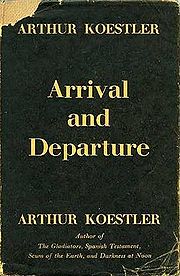
Arrival and Departure
Encyclopedia

Arthur Koestler
Arthur Koestler CBE was a Hungarian author and journalist. Koestler was born in Budapest and, apart from his early school years, was educated in Austria...
's trilogy concerning the conflict between morality and expediency (as described in the postscript to the novel's 1966 Danube Edition). The first volume, The Gladiators, is about the subversion of the Spartacus
Spartacus
Spartacus was a famous leader of the slaves in the Third Servile War, a major slave uprising against the Roman Republic. Little is known about Spartacus beyond the events of the war, and surviving historical accounts are sometimes contradictory and may not always be reliable...
revolt, and the second, Darkness at Noon
Darkness at Noon
Darkness at Noon is a novel by the Hungarian-born British novelist Arthur Koestler, first published in 1940...
, is the celebrated novel about the Soviet Show trials
Great Purge
The Great Purge was a series of campaigns of political repression and persecution in the Soviet Union orchestrated by Joseph Stalin from 1936 to 1938...
. Arrival and Departure was Koestler's first full length work in English
English language
English is a West Germanic language that arose in the Anglo-Saxon kingdoms of England and spread into what was to become south-east Scotland under the influence of the Anglian medieval kingdom of Northumbria...
, The Gladiators was originally written in Hungarian
Hungarian language
Hungarian is a Uralic language, part of the Ugric group. With some 14 million speakers, it is one of the most widely spoken non-Indo-European languages in Europe....
and Darkness at Noon
Darkness at Noon
Darkness at Noon is a novel by the Hungarian-born British novelist Arthur Koestler, first published in 1940...
in German
German language
German is a West Germanic language, related to and classified alongside English and Dutch. With an estimated 90 – 98 million native speakers, German is one of the world's major languages and is the most widely-spoken first language in the European Union....
. It is often considered to be the weakest of the three.
Plot
Written during the middle of World War IIWorld War II
World War II, or the Second World War , was a global conflict lasting from 1939 to 1945, involving most of the world's nations—including all of the great powers—eventually forming two opposing military alliances: the Allies and the Axis...
, Arrival and Departure reflects Koestler's own plight as a Hungarian
Hungary
Hungary , officially the Republic of Hungary , is a landlocked country in Central Europe. It is situated in the Carpathian Basin and is bordered by Slovakia to the north, Ukraine and Romania to the east, Serbia and Croatia to the south, Slovenia to the southwest and Austria to the west. The...
refugee. Like Koestler, the main character is a former member of the Communist party. He escapes to 'Neutralia', a neutral country based on Portugal
Portugal
Portugal , officially the Portuguese Republic is a country situated in southwestern Europe on the Iberian Peninsula. Portugal is the westernmost country of Europe, and is bordered by the Atlantic Ocean to the West and South and by Spain to the North and East. The Atlantic archipelagos of the...
, where Koestler himself had gone, and flees from there. (Stephen Spender
Stephen Spender
Sir Stephen Harold Spender CBE was an English poet, novelist and essayist who concentrated on themes of social injustice and the class struggle in his work...
had supposedly said of Neutralia, "Names like that should not be allowed in novels!") Reflecting Koestler's later life relationship with science, and particularly his disagreement with various movements within psychiatry
Psychiatry
Psychiatry is the medical specialty devoted to the study and treatment of mental disorders. These mental disorders include various affective, behavioural, cognitive and perceptual abnormalities...
, the main character emerges from treatment psychically neutered, and the critical question of the novel is how much of his later trauma and political activity is due to a small incident in his childhood.

